Globalization’s Impact-Impoverishment Urban Workers & Unemployed Migrants and Solutions
Artifact Box Contents
- Gros, Jean-Germain & Olga Prokopovych. (2005) When reality contradicts rhetoric: World Bank lending practices in developing countries in historical, theoretical and empirical perspectives. Dakar: CODESRIA Monograph Series. Useful to those students who choose to investigate financial monopolies and the use of the debt as a weapon.
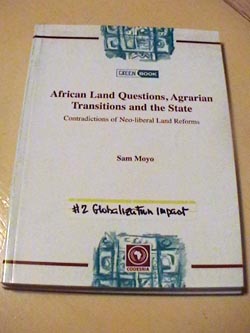 Moyo, Sam . (2008). African land questions, agrarian transitions and the state. Contradictions of neo-liberal land reforms. Dakar: CODESRIA. Useful to those students who choose to investigate monopolies of natural resources by U.S. Midwestern transnational corporations in the agro-industry, like Cargill (Minnesota) and Archer Daniel Midland (Illinois); seed and pesticide monopolies like Aventis (Strasbourg, France), Monsanto (Missouri), Pioneer/Dupont (Iowa), and Syngenta (Basel, Switzerland) are also driving up global food prices; as well as privatization of water for the benefit of monopolies such as Bechtel (California), Veolia/Vivendi (France) and Suez Lyonnaise (France) which are imposed on countries who borrow, both by aid donor countries and by multinational lenders like the World Bank and the International Monetary Fund.
Moyo, Sam . (2008). African land questions, agrarian transitions and the state. Contradictions of neo-liberal land reforms. Dakar: CODESRIA. Useful to those students who choose to investigate monopolies of natural resources by U.S. Midwestern transnational corporations in the agro-industry, like Cargill (Minnesota) and Archer Daniel Midland (Illinois); seed and pesticide monopolies like Aventis (Strasbourg, France), Monsanto (Missouri), Pioneer/Dupont (Iowa), and Syngenta (Basel, Switzerland) are also driving up global food prices; as well as privatization of water for the benefit of monopolies such as Bechtel (California), Veolia/Vivendi (France) and Suez Lyonnaise (France) which are imposed on countries who borrow, both by aid donor countries and by multinational lenders like the World Bank and the International Monetary Fund. 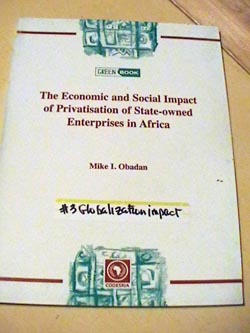 Obadan, Mike I. (2008). The economic and social impact of privatization of state-owned enterprises in Africa. CODESRIA Working Paper Series. Useful to those students who choose to investigate the public policies imposed by the international lending agencies and trade organizations.
Obadan, Mike I. (2008). The economic and social impact of privatization of state-owned enterprises in Africa. CODESRIA Working Paper Series. Useful to those students who choose to investigate the public policies imposed by the international lending agencies and trade organizations. Simone, Abdou Malique & Abouhani, Abdelghani. (2005). Urban Africa. Changing contours of survival in the city. Dakar: CODESRIA Book. Useful to those students who choose to investigate the geographic concentration of urban impoverishment and exclusion in slums without government services.
-
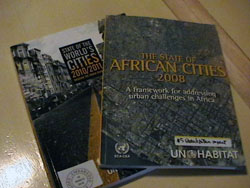 UN HABITAT. (2008). The state of African cities. A Framework for addressing urban challenges in Africa. Nairobi, Kenya: United Nations Human settlements programme. Useful to those students who choose to investigate the geographic concentration of urban impoverishment, exclusion in slums without government services, the war on migrants, environmental racism, and causes of the present day slave trade.
UN HABITAT. (2008). The state of African cities. A Framework for addressing urban challenges in Africa. Nairobi, Kenya: United Nations Human settlements programme. Useful to those students who choose to investigate the geographic concentration of urban impoverishment, exclusion in slums without government services, the war on migrants, environmental racism, and causes of the present day slave trade.  UNHABIT. (2008). State of the world’s cities, 2010-2011. Bridging the urban divide. Nairobi, Kenya: United Nations Human settlements programme. Useful to those students who choose to investigate the geographic concentration of urban impoverishment, exclusion in slums without government services, the war on migrants, environmental racism, and causes of the present day slave trade.
UNHABIT. (2008). State of the world’s cities, 2010-2011. Bridging the urban divide. Nairobi, Kenya: United Nations Human settlements programme. Useful to those students who choose to investigate the geographic concentration of urban impoverishment, exclusion in slums without government services, the war on migrants, environmental racism, and causes of the present day slave trade. 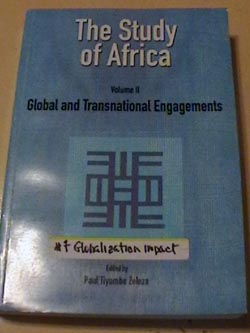 Zeleza, Paul Tiyambe. (Ed.). (2007). The study of Africa, Vol. II: Global and transnational engagements. Dakar: CODESRIA. Useful to those students who choose to investigate production of local knowledge, and the implications of globalization in the teaching about Africa and those forcefully displaced from that region who embody a critique of Western Civilization.
Zeleza, Paul Tiyambe. (Ed.). (2007). The study of Africa, Vol. II: Global and transnational engagements. Dakar: CODESRIA. Useful to those students who choose to investigate production of local knowledge, and the implications of globalization in the teaching about Africa and those forcefully displaced from that region who embody a critique of Western Civilization. 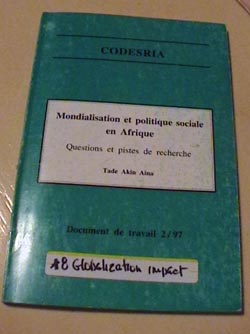 Aina, Tade Akin. (1997, February). Mandialisation et le politique social en Afrique. Questions et pistes de recherché. Dakar: CODESRIA Work Document 2/97. . Useful to those students who choose to investigate the impact of globalization on public policies imposed on debtor countries, and useful research methods used to explore this issue.
Aina, Tade Akin. (1997, February). Mandialisation et le politique social en Afrique. Questions et pistes de recherché. Dakar: CODESRIA Work Document 2/97. . Useful to those students who choose to investigate the impact of globalization on public policies imposed on debtor countries, and useful research methods used to explore this issue. 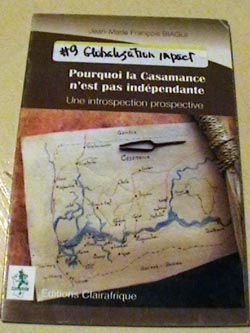 Biagui, Jean-Marie Francois. (2008, December). Pourquoi la Casamance? Une introspection prospective. Dakar: Editions ClairAfrique. . Useful to those students who choose to investigate the relation between the quest for monopolies of natural resources and permanent wars.
Biagui, Jean-Marie Francois. (2008, December). Pourquoi la Casamance? Une introspection prospective. Dakar: Editions ClairAfrique. . Useful to those students who choose to investigate the relation between the quest for monopolies of natural resources and permanent wars. 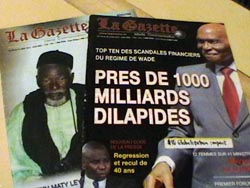 Coulibaly, Prof. Abdoul Latif .(Ed.). Weekly Journal La Gazette, No. 65 (2010, 1 July) & 66 (2010, 8 July). Yoff, Senegal & www.lagazette.sn. . Useful to those students who choose to investigate Islam, one of the problem solving strategies that travel with the migrants, and the lack of transparency with corruption accompanies globalization in the South.
Coulibaly, Prof. Abdoul Latif .(Ed.). Weekly Journal La Gazette, No. 65 (2010, 1 July) & 66 (2010, 8 July). Yoff, Senegal & www.lagazette.sn. . Useful to those students who choose to investigate Islam, one of the problem solving strategies that travel with the migrants, and the lack of transparency with corruption accompanies globalization in the South. 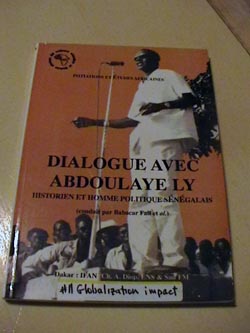 Fall, Babacar (Ed.). (2001). Dialogue avec Abdoulaye Ly. Historien et homme politique Senegalais. Dakar: IFAN-Cheikh Anta Diop University. . Useful to those students who choose to investigate globalization as neo-colonialism, and monopolies in the production of knowledge,
Fall, Babacar (Ed.). (2001). Dialogue avec Abdoulaye Ly. Historien et homme politique Senegalais. Dakar: IFAN-Cheikh Anta Diop University. . Useful to those students who choose to investigate globalization as neo-colonialism, and monopolies in the production of knowledge, 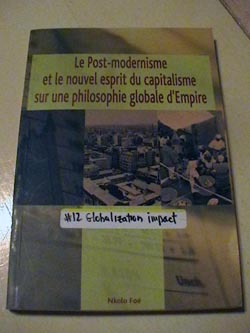 Foe, Nkolo. (2008). Le post-modernisme et le novel esprit du capitalisme sur une philosophie global d’Empire. Dakar: CODESRIA Book. . Useful to those students who choose to investigate the production of explanations for a system of global capitalism, and the rules of evidence. Pay special attention to the Samir Amin preface.
Foe, Nkolo. (2008). Le post-modernisme et le novel esprit du capitalisme sur une philosophie global d’Empire. Dakar: CODESRIA Book. . Useful to those students who choose to investigate the production of explanations for a system of global capitalism, and the rules of evidence. Pay special attention to the Samir Amin preface. 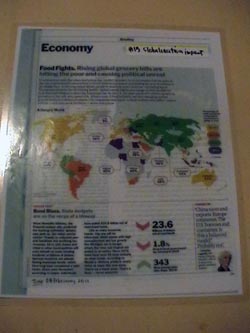 Ly, Abdoulaye. (2008). Pour une politique novatrice de gauche en Afrique: Reflexion d’un vieux militant sur le conditions de coherence et de tolerance. Dakar: Les Nouvelles Editions Africaines. . Useful to those students who choose to investigate the use of socialism and materialism to conduct a progressive reading of the Koran (sacred book of the Muslims), as well as the adaptation of Marxism to an understanding of globalization in Africa.
Ly, Abdoulaye. (2008). Pour une politique novatrice de gauche en Afrique: Reflexion d’un vieux militant sur le conditions de coherence et de tolerance. Dakar: Les Nouvelles Editions Africaines. . Useful to those students who choose to investigate the use of socialism and materialism to conduct a progressive reading of the Koran (sacred book of the Muslims), as well as the adaptation of Marxism to an understanding of globalization in Africa. 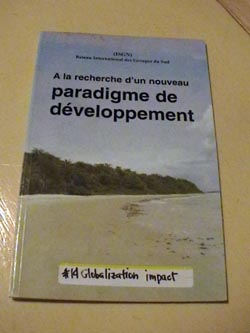 Reseau International des Groupes du Sud. (2006). A la recherché d’un nouveau paradigme de development. Dakar: African Forum of Alternatives. Useful to those students who choose to investigate the notion of “development” as a dominant way of thinking and exercising colonial power, as well as the need for social movements to challenge its premises.
Reseau International des Groupes du Sud. (2006). A la recherché d’un nouveau paradigme de development. Dakar: African Forum of Alternatives. Useful to those students who choose to investigate the notion of “development” as a dominant way of thinking and exercising colonial power, as well as the need for social movements to challenge its premises.